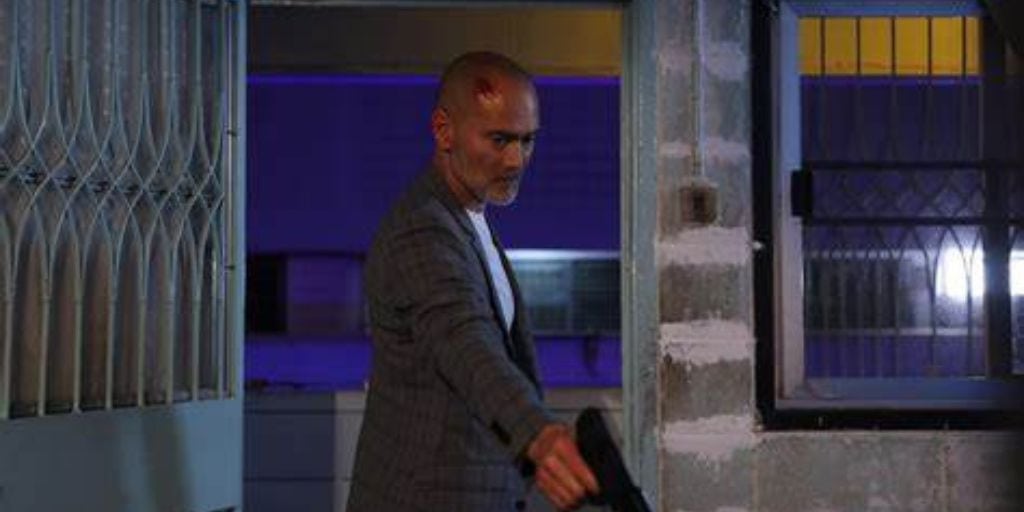“Collateral,” a 2004 thriller directed by Michael Mann and starring Jamie Foxx and Tom Cruise as a hitman and a taxi driver who become entangled in the hitman’s murderous rampage throughout a single night, is essentially what “One Night in Bangkok” is—a far worse imitation.
For his performance in “Collateral,” which was also nominated for an Oscar for best picture editing, Foxx received a nomination. “One Night in Bangkok” stands apart only from the many terrible films that writer/director Wych Kaosayananda has helmed, including the infamous 2002 abomination “Ballistic: Ecks vs. Sever,” starring Antonio Banderas and Lucy Liu.
Murray Head’s 1985 “Chess” musical composition “One Night in Bangkok” has nothing to do with the crime thriller “One Night in Bangkok.” Unfortunately, this awful movie had nothing to do with either storytelling or logic.
One Night In Bangkok Movie Ending Explained
Whereas “Collateral” portrayed the story from the driver’s perspective, “One Night in Bangkok” switches to the hitman’s. Mark Dacascos portrays him as Kai Khale, an American who has journeyed from Hawaii to Bangkok. He is picked up by an anonymous man on a motorbike when he gets to Bangkok.

Kai receives a duffel bag from the mystery man that includes cash, a cell phone, and a gun with a silencer. Kai has a cool, collected manner that suggests he understands where he’s heading but isn’t in a rush to get there. Kai makes a call to a ridesharing service after that. He arranges transportation with Vanida “Fha” Hoffstead, a driver (Vanida Golden).
Now, it is 8:10 p.m. On the way to his first location, an insurance company, Kai and Fha, strike up a nice chat. Kai says he’s visiting a lawyer there. Although the appointment with the insurance firm is at an odd hour, Fha figures the lawyer must be working late.
During their little discussion, Fha shares a little bit about herself with Kai. She claims that because she has more time at night, she chooses to be a rideshare driver. However, Kai then acts a little strange and begins to interrogate her inappropriately about personal matters, such as how she handles men who approach her for a date because of her attractive appearance.
In addition, Kai questions Fha about her single status and why she hasn’t been married. She responds, “I never got around to it.” Fha readily and freely responds to Kai’s queries because he is so courteous and even apologizes beforehand for being so inquisitive.
Fha also shares a tiny part of her past with us: She has resided in Thailand her entire life. Her mother is Thai, and her father is British. Fha adds that her sibling suffers from multiple sclerosis. In a compassionate response, Kai says, “A long time ago,” he was a field medic.
Other than gushing about how much he loves fishing later in the talk, he won’t tell anything more about himself. Fha claims that although she took English classes in college, she is constantly working to improve her language skills, primarily through watching YouTube videos and movies.
Kai proceeds with his inquisitive inquiries, inquiring about Fha’s normal Friday night earnings as a rideshare driver. On a good Friday night, she can make between $1,000 and $1,200, she informs him. Kai then informs her that he needs to stop at four more locations after leaving the insurance company: a police station, a nightclub, a hospital, and a house.
Kai offers Fha $5,000 if she drives him to every destination on his itinerary. He tells her that she can cancel the trip at any time and that he can give her a $1,000 down payment. If Fha takes Kai to all the locations he asked to be driven to that evening, she will receive the remaining $4,000.

Anyone with street smarts would now assume that this odd offer is motivated by unlawful activity. If not, why would someone need to pay so much for the basic service of driving someone to multiple locations? But because Kai has a polished appearance and a kind manner, Fha looks to be easily tricked.
When Fha questions him about why he must make these stops, Kai explains that it has to do with a case that concerns his daughter and her family. In addition, Kai claims he must “repay” the case’s participants. Fha is also informed by Kai that she is welcome to ask him any questions, but she is not permitted to search his duffel bag.
Fha accepts the bargain and naively claims that it’s because she needs the money, failing to recognize these “red flag” warning indications that indicate she’s going to get involved in anything unlawful if she says yes.




